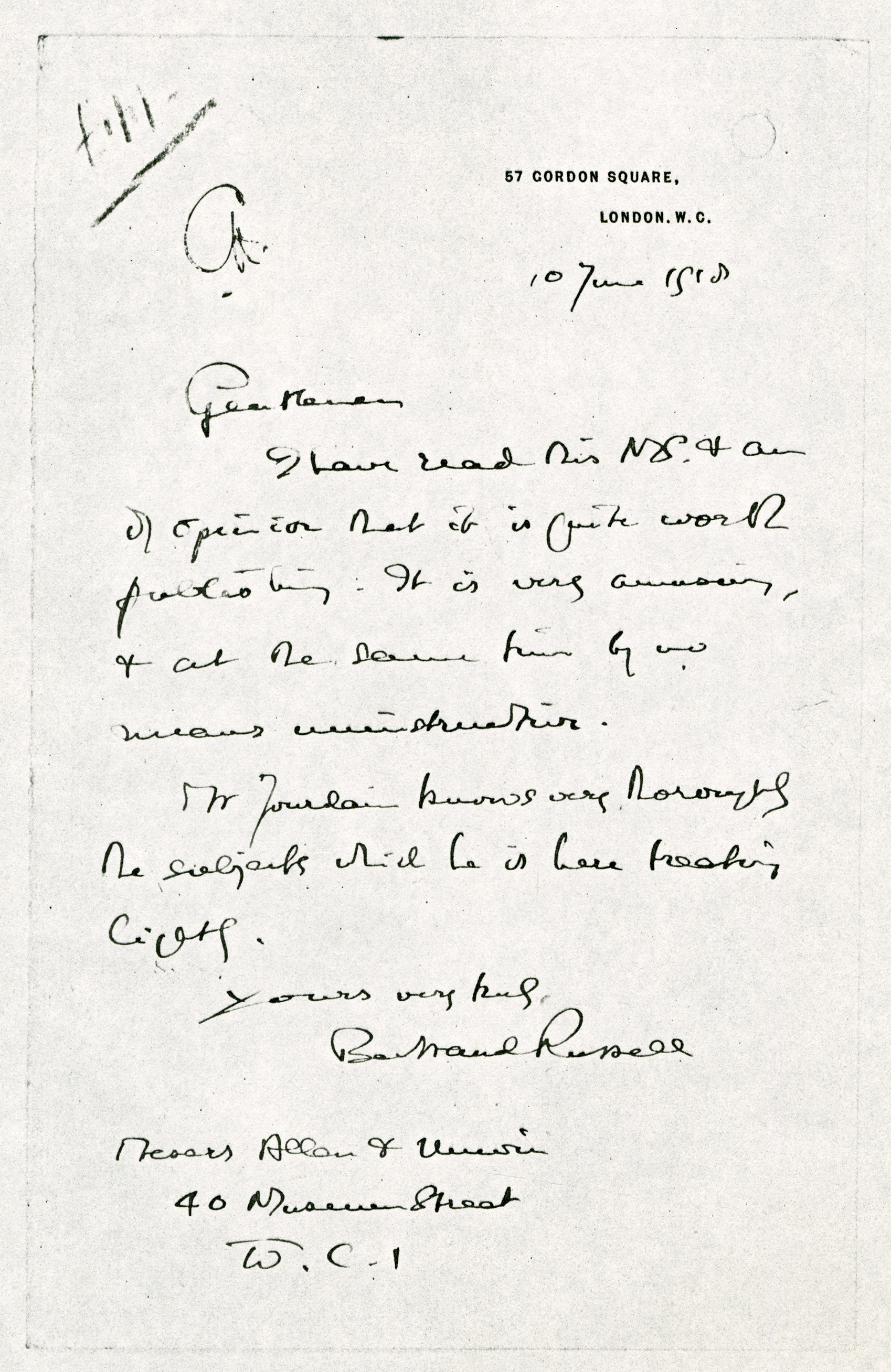Brixton Letter 16
BR to George Allen & Unwin Ltd.
June 10, 1918
- ALS
- Reading
- Edited by
Kenneth Blackwell
Andrew G. Bone
Nicholas Griffin
Sheila Turcon
Cite The Collected Letters of Bertrand Russell, https://russell-letters.mcmaster.ca/brixton-letter-16
BRACERS 47454
57 GORDON SQUARE,1
LONDON, W.C.
<Brixton Prison>
10 June 1918
Messrs Allen & Unwin
40 Museum Street
W.C.1
Gentlemen
I have read this MS.2 and am of opinion that it is quite worth publishing. It is very amusing, and at the same time by no means uninstructive.
Mr Jourdain knows very thoroughly the subjects which he is here treating lightly.
Yours very truly,
Bertrand Russell
- 1
[document] The letter was edited from a photocopy in the Russell Archives of the signed, single-sheet original in BR’s hand in the George Allen & Unwin archives at Reading University. The letter has the Governor’s initials, “CH”.
- 2
this MS. Of P.E.B. Jourdain’s The Philosophy of Mr. B*rtr*nd R*ss*ll with an Appendix of Leading Passages (London: Allen & Unwin, 1918). The book has two characters, the quasi-fictional B*rtr*nd R*ss*ll and his “distinguished contemporary” (p. 3), BR himself. The Editor’s Note goes on. The former, R*ss*ll, was torn to pieces by anti-suffragists in 1911. However — and shades of BR’s 1916 dismissal from Trinity College and even his 1918 imprisonment — R*ss*ll “had been forbidden to lecture on philosophy or mathematics by some well-intentioned advocates of freedom in speech who thought that the cause of freedom might be endangered by allowing Mr. R*ss*ll to speak freely on points of logic, on the grounds, apparently, that logic is both harmful and unnecessary and might be applied to politics unless strong measures were taken for its suppression. On much the same grounds his liberty was taken from him …” (p. 4).
57 Gordon Square
The London home of BR’s brother, Frank, 57 Gordon Square is in Bloomsbury. BR lived there, when he was in London, from August 1916 to April 1918, with the exception of January and part of February 1917.
Brixton Prison
Located in southwest London Brixton is the capital’s oldest prison. It opened in 1820 as the Surrey House of Correction for minor offenders of both sexes, but became a women-only convict prison in the 1850s. Brixton was a military prison from 1882 until 1898, after which it served as a “local” prison for male offenders sentenced to two years or less, and as London’s main remand centre for those in custody awaiting trial. The prison could hold up to 800 inmates. Originally under local authority jurisdiction, local prisons were transferred to Home Office control in 1878 in an attempt to establish uniform conditions of confinement. These facilities were distinct from “convict” prisons reserved for more serious or repeat offenders sentenced to longer terms of penal servitude.
Governor of Brixton Prison / Carleton Haynes
Captain Carleton Haynes (1858–1945), the Governor of Brixton Prison in 1918, was a retired army officer and a cousin of BR’s acquaintance, the radical lawyer and author E.S.P. Haynes. In March 1919 BR sent Haynes, in jest, a copy (now in the Russell Archives) of his newly published Introduction to Mathematical Philosophy — so that the governor’s collection of works written by inmates while under his charge would “not ... be incomplete” (BRACERS 123167).
Philip Jourdain
Philip Edward Bertrand Jourdain (1879–1919), Cambridge-educated logician and historian of mathematics and logic. As a student at Cambridge he took BR’s course on mathematical logic in 1901–02 and subsequently wrote many articles on mathematical logic, set theory, and the foundations of mathematics, among a number of other topics. His extraordinary productivity was achieved despite the ravages of Friedreich’s ataxia, a form of progressive paralysis that killed him in 1919. His extensive correspondence with BR was published (with commentary) in I. Grattan-Guinness, Dear Russell — Dear Jourdain (London: Duckworth, 1977).
George Allen & Unwin Ltd.
George Allen & Unwin Ltd., founded by Stanley Unwin in 1914, was BR’s chief British publisher, had published Principles of Social Reconstruction in 1916, and was in the process of publishing Roads to Freedom (1918) while BR was in Brixton.
